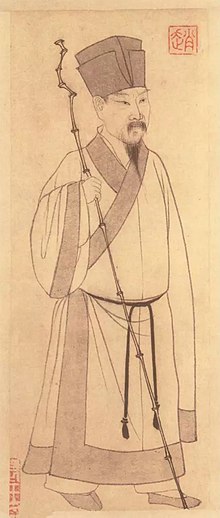
Back سو شي Arabic سو شى ARZ Су Шы Byelorussian སུའུ་ཧྲི། Tibetan Su Shi Catalan Sŭ Sék CDO Su Š’ Czech Su Shi German Su Ŝi Esperanto Su Shi Spanish
Su Shi (simplified Chinese: 苏轼; traditional Chinese: 蘇軾; pinyin: Sū Shì; 8 January 1037 – 24 August 1101), courtesy name Zizhan (子瞻), art name Dongpo (東坡), was a Chinese poet, essayist, calligrapher, painter, and scholar-official who lived during the Song dynasty.[3] A major personality of the Song era, Su was an important figure in Song Dynasty politics, he had a lengthy career in bureaucracy, taking various provincial posts and briefly serving as a senior official at the imperial court. Despite his high hopes to serve the country, Su's political career was filled with frustrations due to his out-spoken criticism, and he often fell victim to political rivalries between the radical and the conservative forces. [4] He endured a series of political exiles during which his creative career flourished.[5]
Su is widely regarded as one of the most accomplished figures in classical Chinese literature,[4] leaving behind him a prolific collection of poems, lyrics, prose, and essays. His poetry had enduring popularity and influence in China and other areas in the near vicinity such as Japan, and is well known in some English-speaking countries through translations by Arthur Waley and Stephen Owen, among others. In arts, Su was described by Murck as "the preeminent personality of the eleventh century."[6] His prose writings contributed to the understanding of topics including 11th-century China's travel literature and iron industry.[7] His writing frequently touched upon the topic of cuisine, where he is considered to have had a profound influence.[8] Dongpo pork, a prominent dish in Hangzhou cuisine, is named in his honor.
Su remains a revered and beloved figure among both intellectuals and the general populace, transcending the boundaries of his era. Contemporary researchers Zhu and Wang have observed that Su's impact on the Chinese people's values and beliefs is profound, asserting that his cultural and philosophical influence rivals that of notable philosophers like Mencius and Zhuangzi.[9]
- ^ Su Shi wrote in his short essay Xian Qu Qiu Shi that his birthday was on the 19th day of the 12th month. Also, his biography in History of Song indicated that he was 66 (by East Asian reckoning) when he died in the 1st year of the Jian'zhong Jing'guo era of Emperor Huizong's reign (1101 in the Julian calendar) (《献曲求诗》:元丰五年十二月十九日东坡生日,置酒赤壁矶下,踞高峰,酒酣,笛声起于江上。客有郭、尤二生,颇知音,谓坡曰:"笛声有新意,非俗工也。”使人问之,则进士李委闻坡生日,作南曲目《鹤南飞》以献。呼之使前,则青巾紫裘腰笛而已。既奏新曲,又快作数弄,嘹然有穿云石之声,坐客皆引满醉倒。委袖出嘉纸注一幅曰:"吾无求于公,得一绝句足矣。”坡笑而从之。)
- ^ According to Su Zhe's epitaph for his elder brother, Su Shi died on the dinghai day of the 7th month of the 1st year of the Jian'zhong Jing'guo era of Emperor Huizong's reign. This corresponds to 24 Aug 1101 in the Julian calendar.
- ^ Whitfield, Roderick (2003). "Su Shi". Grove Art Online. Bibliography updated by Henning von Mirbach. Oxford: Oxford University Press. doi:10.1093/gao/9781884446054.article.T082440. ISBN 978-1-884446-05-4. (subscription or UK public library membership required)
- ^ a b Zhang, Longxi (4 November 2022). A History of Chinese Literature. London: Routledge. pp. 217–218. doi:10.4324/9781003164173. ISBN 978-1-003-16417-3.
- ^ Ridgway, Benjamin (2012). "From the Banquet to the Border: The Transformation of Su Shi's Song Lyrics into a Poetry of National Loss in the Restoration Era". Chinese Literature: Essays, Articles, Reviews (CLEAR). 34: 57–103. ISSN 0161-9705. JSTOR 43490145.
- ^ Murck (2000), p. 31.
- ^ Wagner, Donald B. (2001). "The Administration of the Iron Industry in Eleventh-Century China". Journal of the Economic and Social History of the Orient. 44 (2): 175–197. doi:10.1163/156852001753731033. ISSN 0022-4995. JSTOR 3632326.
- ^ Wilkinson 2018, p. 510.
- ^ Wang and Zhu, preface
